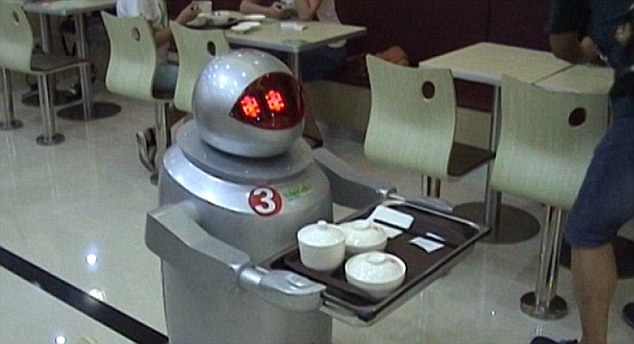A restaurant in Multan recently became the center of attention not because of its taste but for its use of robotic waitresses, the first of its kind in Pakistan. The business of Syed Aziz Ahmed Jafari, owner of the fast food restaurant, boomed after he introduced this novel idea in his restaurant.
Syed’s son, Osama Aziz, an electrical engineering graduate, originally came up with the idea of employing robotic waitresses. The spectacle of robots serving food has since been stealing all the spotlights in Multan.
“Even people from other cities are coming to take a look at the robot and get served by it”, said the restaurant owner.
While it may be a novel experience in Pakistan, many Chinese and American restaurants started using robotic waiters as early as 2006. Though initially some of them proved quite incompetent, these worker robots however improved in their functionality with the passage of time, which resulted in more restaurants adopting the trend.
With Osama’s introduction of robots as waiters in Pakistan, it is more likely many others in the country will jump on the bandwagon of this technological innovation. The idea of robots serving food to customers is a fascinating one, and one that certainly attracts more customers who want to experience this technological innovation, especially kids who love getting served by robots.
However, novelty and fun part aside, there is an unintended down side to this idea, something whose effects we might only see in future, just like we have seen in China and many other countries.
Many human waiters have gone jobless after the introduction of robotic waiters by restaurants. The price of a robot is a one-time cost for the restaurant owner which is just a couple of months salary of a waiter.
Moreover, with the advancement in robotic technology and it becoming more affordable by the day, more and more restaurateurs will be tempted to do this one-time investment in robots and cut on the long term huge cost of employing humans as waiters.
Artificial Intelligence (AI) is getting leaps and bounds in its bid to instill human-like intelligence in machines. Each step forward by AI puts many jobs at risk of being taken over by machines.
Kai-Fu Lee, an influential technologist from China who previously headed Google China and is the founder of venture capital firm Sinovation Ventures, recently said Robots were likely to replace 50 percent of all jobs in the next decade.
There are already calls for new laws to protect robots from stealing human jobs. Gerlind Wisskirchen, vice-chair of the global employment institute, said existing laws regulating employment and safety are becoming rapidly outdated and need to be revised to include human job safety from the AI and robotic over-take.
While the pace of robots taking over our jobs might be slow, especially in a third-world country like Pakistan, it is inevitable. It is thus necessary to introduce laws to protect human jobs from getting stolen by AI.





